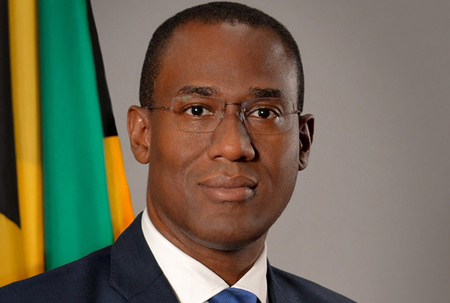FINANCE Minister Dr Nigel Clarke on Wednesday moved to allay anxieties in the public sector over back pay and new salaries due this month, urging that delays not be construed as a crisis.
He advised at a hurriedly convened press conference at the ministry that disbursements were made by the Accountant General’s Department to the financial institutions of employees of 47 out of 52 ministries, agencies and departments (MDAs), as of Wednesday morning.
He said payments for the remaining five MDAs — Ministry of Health, the southern and western regional health authorities, Bellevue Hospital, Houses of Parliament, and the administrative staff of the Ministry of Education — which were undergoing a quality control process, would have been resolved by Wednesday afternoon.
Dr Clarke explained that funds for the five entities had been delayed for a day at most, in the transfer process to their respective banks.
He pointed out that monthly salaries are usually paid on the 25th of each month, and were brought forward to make payments early in consideration of the Christmas holidays. Pointing out that the finance ministry is not in control of all levels of the process, Dr Clarke said that persons should consider that financial institutions have to credit each individual account.
Dr Clarke emphasised that the compensation mechanism is a multi-layered, complex one, and delays should not be construed as a crisis: “A delay is not an experience that is unusual [but] it’s not an ordinary payday; it’s a payday that includes the arrears for an entirely new compensation system, a transformation of which we don’t have a historical precedent. Not only have we brought it [payday] forward, we have implemented a completely new compensation system — which we have never done. I should hope that with this transparency doesn’t fuel the sense that there is some crisis.”
Up to late Wednesday some public sector employees were still complaining of unpaid salaries just days before the Christmas holidays, while others expressed dismay and confusion over deductions indicated on their new payslips, formulated under the Government’s reformed compensation scheme.
The minister indicated that there were issues with the payroll system for the Ministry of Local Government and Rural Development, which could not process the calculations, and that 183 workers had therefore agreed to accept their retroactive payments in January. The Government is pushing to have the 13 payroll systems it currently uses replaced by one central system, which Dr Clarke said should be fully rolled out within another two years.
Regarding the massive retroactive deductions which some workers have complained of, the finance minister stressed that notwithstanding that the new salary arrangements are being rolled out this pay cycle, the agreement with unions representing the workers took effect in April, which means allowances, now removed from the system but which have already been paid out over the past nine months, have to be accounted for.
“As of April 2022 we have to take account of all payments that employees have received, whether those were in the form of salary, taxable allowances, or non-taxable allowances. The auditor general would require that we take account of all payments that were received, (or) you would have a problem with the auditor general. You could not agree that a new compensation system is payable April 1 and then ignore what people have already been paid,” he said, stressing that without the minimum guaranteed floor of 17.5 per cent over three years, (now revised to 20 per cent), persons could have ended up with negative arrears.
Dr Clarke noted also that the timeline for roll-out of the new compensation system would have presented a challenge.”The implementation timeline has been compressed by the fact that we signed off with unions between the middle and end of November, and had essentially between 14 and 21 days for the implementation,” he said, noting that the ministry and the unions had worked feverishly to have workers receive their payments as quickly as possible and in time for the Christmas holidays.
When Opposition spokesman on finance, Julian Robinson queried weeks ago during discussions on the second supplementary estimates in Parliament whether the Government would have allowances paid since April clawed back, or have workers refund those payments, Dr Clarke said, “there would be no refund required, we would just go forward”.
There has been some level of disquiet in the public sector among workers over what is now seen as the Government giving with one hand, and “taking back” at the same time. Efforts since Tuesday to obtain comments from the Jamaica Civil Service Association (JCSA) and the Jamaica Confederation of Trade Unions were unsuccessful.
The House of Representatives approved a supplementary budget of $30.4 billion earlier this month to enable the Government to pay 60,000 central government employees retroactive payments and begin paying new salaries this month. Another supplementary budget is expected to go to Parliament to account for payments to employees of public bodies.










